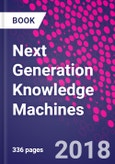This book delivers the scientific and mathematical basis to treat and process knowledge as a quantifiable and dimensioned entity. It provides the units and measures for the value of information contained in a "body of knowledge" that can be measured, processed, enhanced, communicated and preserved. It provides a basis to evaluate the quantity of knowledge acquired by students at various levels and in different universities. The effect of time on the dynamics and flow of knowledge is tied to Internet knowledge banks and provides the basis for designing and building the next generation of novel machine to appear in society.
This book ties the basic needs of all human beings to the modern machines that resolve such need based on Internet knowledge banks (KBs) distributed throughout nations and societies. The features of the Intelligent Internet are fully exploited to make a new generation of students and knowledge workers use the knowledge resources elegantly and optimally. It deals with topics and insight into the design and architecture of next-generation computing systems that deal with human and social problems. Processor and Internet technologies that have already revolutionized human lives form the subject matter and the focal point of this book. Information and knowledge on the Internet delivered by next-generation mobile networks form the technical core presented. Human thought processes and adjustments follow the solutions offered by machines.
- Extends the established practices and designs documented in computer systems to encompass the evolving knowledge processing field
- Provides an academic and industrial viewpoint of the concurrent dynamic changes in computer and communication industries
- Presents information for all perspectives, from managers, scientists and researchers
- Basic concepts can be applied to other disciplines and situations
Table of Contents
Part I Technological Foundations and Human Aspect of Knowledge
1. Computational Framework
2. Human and Social Aspects
3. Processing, Switching and Communication of Knowledge
Part II Quantitative Aspects of Knowledge
4. Quantization of Knowledge
5. Needs, Resources, Deployment and Gratification
6. Nature, Abundance and Needs
Part III Knowledge Dynamics
7. Foundations of Knowledge
8. Flow of Knowledge
9. Design Constructs of a Knowledge Machine
10. Knowledge Science
11. Knowledge Flow in Universities








